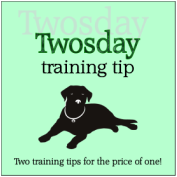 TIP #1: DON'T CHEW ON THAT On occasion, an adult dog who has been trustworthy with his chewing habits may suddenly surprise you with an oral foray into the forbidden. This may be a stress response to something environmental happening in your absence, such as a burglar trying to break into your home, loud equipment working in the street in front of your house, or stray dogs romping through your yard. Or, a return to inappropriate chewing may be a result of inactivity and pent-up energy. Perhaps the weather's been bad or your workload extra heavy, curtailing your normal exercise sessions with your canine companion. That energy has to go somewhere - and for some dogs, it goes right to their jaws. If you can determine the nature of the stressor and control or remove the cause, your dog should quickly revert to his prior good chewing behavior. He might also need a refresher course in the crate, after a veterinary exam to rule out possible medical causes. (Anytime there's a significant behavior change in an adult dog it's important to rule out - or treat - any possible medical contributors to the undesirable behavior.) - excerpted from The Whole Dog Journal TIP #2: USE TRAINING TREATS STRATEGICALLY For behavior that your dog already knows (e.g., sit), use lower-value treats, like pieces of his kibble. When you want to encourage him to learn a new behavior, use higher-value treats. The reward should be commensurate with the difficulty of the task. - Patricia Bentz Comments are closed.
|
AuthorJeff Dentler, CPDT-KA, IAABC-ADT, FFCP, CTDI Archives
July 2024
Categories |

 RSS Feed
RSS Feed